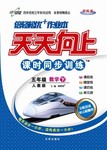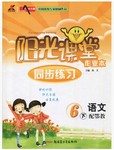题目内容
He ________ five dollars for the shirt, though he didn’t really _______ it.
A. spend, enjoy B. took, love
D. cost, fond of D. paid, want
D
Pay some money for sth.的固定搭配。

 天天向上课时同步训练系列答案
天天向上课时同步训练系列答案 阳光课堂同步练习系列答案
阳光课堂同步练习系列答案完形填空(共20小题;每小题1。5分,满分30分)
阅读下面短文,掌握其大意,然后从36—55各题所给的四个选项(A、B、C和D)中,选出最佳选项,并在答题卡上将该项涂黑。
When I was a teenager, my dad did everything he could do to advise me against becoming a brewer (造酒人). He’d 36 his life brewing beer for local breweries only to make a living, 37 had his father and grandfather before him. He didn’t want me 38 near a vat (酿酒用的桶) of beer. So I did as he asked. I got good 39 , went to Harvard and in 1971 was accepted into a graduate program there that 40 me to study law and business at the same time.
In my second year of graduate school, I began to realize that I’d 41 done anything but go to school. So, at 24 I decided to drop out. 42 , my parents didn’t think this was a great idea. But I felt strongly that you can’t 43 till you’re 65 to do what you want in life.
I packed my stuff into a bus and headed for Colorado to become an instructor at Outward Bound. Three years later, I was ready to go back to 44 . I finished Harvard and got a highly-paid job at the Boston Consulting Group Still, after working there five years, I 45 , “Is this what I want to be doing when I’m 50?” At that time, Americans spent good money on beer in 46 quality. Why not make good beer for 47 ? I thought.
I decided to give up my job to become 48 . When I told Dad, he was 49 , but in the end he 50 me. I called my beer Samuel Adams, 51 the brewer and patriot (爱国者) who helped to start the Boston Tea Party. 52 I sold the beer direct to beer drinkers to get the 53 out. Six weeks later, at the Great American Beer Festival, Sam Adams Boston Lager (淡啤酒) won the top prize for American beer. In the end I was destined (注定) to be a brewer. My 54 to the young is simple: Life is very 55 , so don’t rush to make decisions. Life doesn’t let you plan.
| 【小题1】 |
|
| 【小题2】 |
|
| 【小题3】 |
|
| 【小题4】 |
|
| 【小题5】 |
|
| 【小题6】 |
|
| 【小题7】 |
|
| 【小题8】 |
|
| 【小题9】 |
|
| 【小题10】 |
|
| 【小题11】 |
|
| 【小题12】 |
|
| 【小题13】 |
|
| 【小题14】 |
|
| 【小题15】 |
|
| 【小题16】 |
|
| 【小题17】 |
|
| 【小题18】 |
|
| 【小题19】 |
|
| 【小题20】 |
|
 ly does this make it easier to pick up other languages and have a better memory of one’s own, we have also seen musicians are able to pick out exactly what others are feeling just by the tones of their voices—sympathy, disappointment, that kind of things.”
ly does this make it easier to pick up other languages and have a better memory of one’s own, we have also seen musicians are able to pick out exactly what others are feeling just by the tones of their voices—sympathy, disappointment, that kind of things.” th non-musicians, __________.
th non-musicians, __________. ssing
ssing